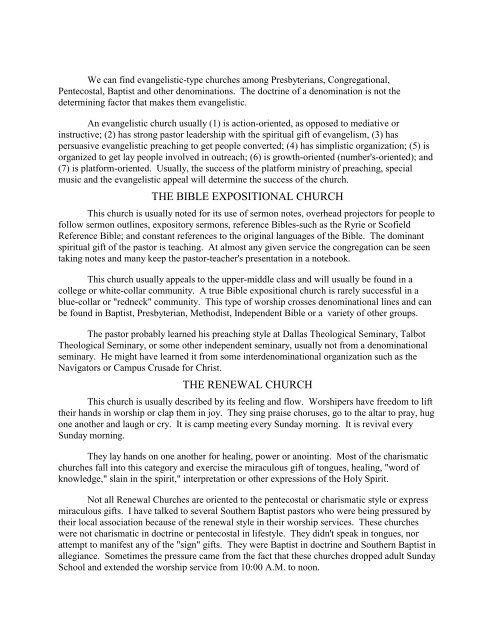PUTTING AN END TO WORSHIP WARS - Elmer Towns
PUTTING AN END TO WORSHIP WARS - Elmer Towns
PUTTING AN END TO WORSHIP WARS - Elmer Towns
- TAGS
- worship
- elmer
- towns
- elmertowns.com
You also want an ePaper? Increase the reach of your titles
YUMPU automatically turns print PDFs into web optimized ePapers that Google loves.
We can find evangelistic-type churches among Presbyterians, Congregational,<br />
Pentecostal, Baptist and other denominations. The doctrine of a denomination is not the<br />
determining factor that makes them evangelistic.<br />
An evangelistic church usually (1) is action-oriented, as opposed to mediative or<br />
instructive; (2) has strong pastor leadership with the spiritual gift of evangelism, (3) has<br />
persuasive evangelistic preaching to get people converted; (4) has simplistic organization; (5) is<br />
organized to get lay people involved in outreach; (6) is growth-oriented (number's-oriented); and<br />
(7) is platform-oriented. Usually, the success of the platform ministry of preaching, special<br />
music and the evangelistic appeal will determine the success of the church.<br />
THE BIBLE EXPOSITIONAL CHURCH<br />
This church is usually noted for its use of sermon notes, overhead projectors for people to<br />
follow sermon outlines, expository sermons, reference Bibles-such as the Ryrie or Scofield<br />
Reference Bible; and constant references to the original languages of the Bible. The dominant<br />
spiritual gift of the pastor is teaching. At almost any given service the congregation can be seen<br />
taking notes and many keep the pastor-teacher's presentation in a notebook.<br />
This church usually appeals to the upper-middle class and will usually be found in a<br />
college or white-collar community. A true Bible expositional church is rarely successful in a<br />
blue-collar or "redneck" community. This type of worship crosses denominational lines and can<br />
be found in Baptist, Presbyterian, Methodist, Independent Bible or a variety of other groups.<br />
The pastor probably learned his preaching style at Dallas Theological Seminary, Talbot<br />
Theological Seminary, or some other independent seminary, usually not from a denominational<br />
seminary. He might have learned it from some interdenominational organization such as the<br />
Navigators or Campus Crusade for Christ.<br />
THE RENEWAL CHURCH<br />
This church is usually described by its feeling and flow. Worshipers have freedom to lift<br />
their hands in worship or clap them in joy. They sing praise choruses, go to the altar to pray, hug<br />
one another and laugh or cry. It is camp meeting every Sunday morning. It is revival every<br />
Sunday morning.<br />
They lay hands on one another for healing, power or anointing. Most of the charismatic<br />
churches fall into this category and exercise the miraculous gift of tongues, healing, "word of<br />
knowledge," slain in the spirit," interpretation or other expressions of the Holy Spirit.<br />
Not all Renewal Churches are oriented to the pentecostal or charismatic style or express<br />
miraculous gifts. I have talked to several Southern Baptist pastors who were being pressured by<br />
their local association because of the renewal style in their worship services. These churches<br />
were not charismatic in doctrine or pentecostal in lifestyle. They didn't speak in tongues, nor<br />
attempt to manifest any of the "sign" gifts. They were Baptist in doctrine and Southern Baptist in<br />
allegiance. Sometimes the pressure came from the fact that these churches dropped adult Sunday<br />
School and extended the worship service from 10:00 A.M. to noon.
















